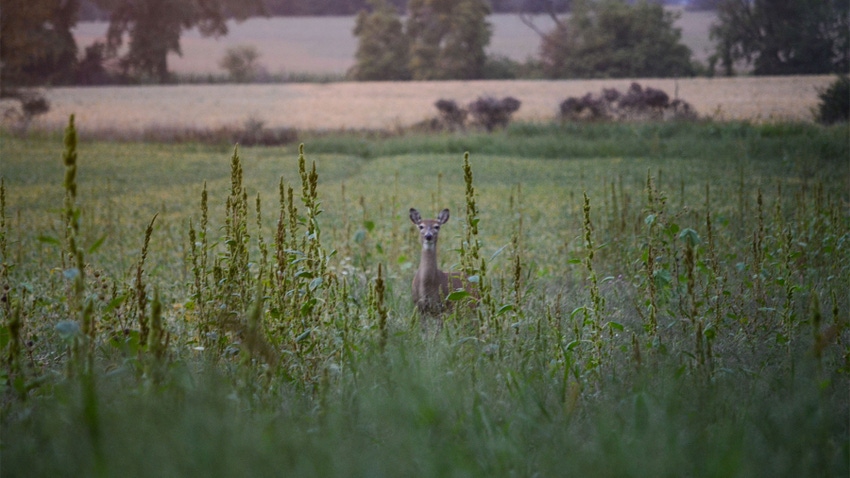January 23, 2024

Organized and hosted by the New York Forest Owners Association, this year’s forestry seminars at New York Farm Show will feature talks on deer management, insects and diseases, supporting pollinators, and more.
The seminars will be held Feb 23-24 in the Martha Eddy Room of the Arts and Home Building.
Here’s the complete seminar schedule:
Friday, Feb. 23
10 to 11 a.m.: “Best practices on a small woodlot,” presented by Peter Smallidge, Extension forester with Cornell Cooperative Extension.
Small woodland parcels are endearing to owners and provide many opportunities for activities to ensure they remain healthy and support the owner’s interests. There are several simple and basic actions that owners can take to be active in their woods and to enjoy the land to its fullest extent.
11 a.m. to noon: “Firewood from private woodlands: Techniques, tactics and production,” presented by Peter Smallidge, Extension forester with Cornell Cooperative Extension.
Woodlot owners should consider their scale of production, what equipment they have or can borrow, what trees to select, how to fell trees to optimize production and safety, logistics and options for bucking and moving, and how to handle and store the wood.
1 to 2 p.m.: “Deer management and problems,” presented by Brendon Quirion, big-game biologist with New York State Department of Environmental Conservation.
White-tailed deer can have a significant impact on forest ecosystems, but steps can be taken to mitigate the damage. This presentation will focus on DEC’s approach to managing deer populations and what deer management options are available to landowners who want to promote forest health.
2 to 3 p.m.: “Insects and diseases in your woods,” presented by Kim Adams, SUNY College of Environmental Science and Forestry.
There are many different insects and diseases that affect the growth and development of New York’s woods and forests. Recognizing signs of infestation by some of the typical invaders is the first step to controlling them and will lead to better management of your land.
Saturday, Feb. 24
10 to 11 a.m.: “Maple syrup making for the small producer,” presented by Kristina Ferrare of the New York State Maple Producers Association.
Producing sweet maple syrup from your own sugar maple trees can be both fun and educational. Recent developments in equipment and techniques make it possible for landowners to make syrup from their own trees. From owning just a few acres to more extensive woodlands, there are opportunities to make syrup for your own use or to sell.
11 a.m. to noon: “Supporting pollinators in woodlands,” presented by Lacey Smith, biologist with the Pollinator Partnership and USDA’s Natural Resources Conservation Service.
Native insects and birds (pollinators) provide vital ecosystem services and food security, but they are facing challenges from invasive species and habitat loss. This presentation will show how to support native pollinators with trees and shrubs and several cost-sharing programs through NRCS that directly or indirectly support pollinators.
1 to 2 p.m.: “Landowner liability in rural New York,” presented by Brendan Conley of Colligan Law Firm.
There are several New York state laws relating to recreational use of private rural lands, as well as properly posting private land. This presentation could be useful for forest owners, given the complexities and concerns involved in ownership and management of rural, expansive or densely wooded property.
2 to 3 p.m.: “New laws, regulations and programs that can affect your property,” presented by John Bartow, executive director of Empire State Forest Products Association.
The New York State Legislature and agencies tackle a wide variety of bills, regulations and programs each year. Many of these can have a great effect on what you might or might not be able to do on your own woodlot. An update of the current activity in Albany will help you understand the changing political scene.
3 to 4 p.m.: “CommuniTree Steward Program,” presented by Leanna Nugent, community forestry specialist with Cornell Onondaga County Cooperative Extension.
The CommuniTree Steward Program is a volunteer, service-based program with Cornell Cooperative Extension where volunteers learn the basics about trees, including urban forestry, and then assist in tree projects throughout the community.
New York Farm Show will be held Feb. 22-24 at the New York State Fairgrounds in Syracuse. For more information on the show, visit newyorkfarmshow.com.
Source: NYFS
Read more about:
ForestryYou May Also Like




